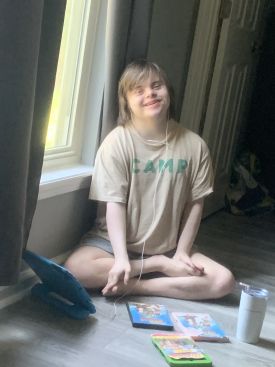Enter your email to receive the CareQuest newsletter:
June 16, 2025
Victoria Neely noticed that her son Joshua was having some behavioral issues when he was in elementary school. She wasn’t sure why. When she took him to a pediatric dentist, they discovered a potential culprit: an abscessed tooth.
“He was very combative in the dental chair,” Neely says. “But he was little enough that his dad could hold him.”
Today, that’s not an option.

Joshua was born with Down Syndrome and a congenital heart defect. When he was in elementary school and having behavioral issues, pediatric specialists diagnosed him with non-speaking autism. The medical challenges quickly piled up.
“All through his life, Joshua had a lot of hospitalizations for pneumonias, surgeries,” Neely says. “He was hospitalized and put on a ventilator, had spinal fusion surgery, open-heart surgery, and had complications with his lungs.”
Joshua also has severe sensory issues where he doesn’t like anything near his mouth. Haircuts and cutting his nails are a challenge, too.
Joshua is now 23 and lives in northeast Florida with Victoria and his siblings. Pediatric care is no longer an option, which has made it even more complicated for him to get the oral health care he needs.
“We can’t find anybody,” Neely says.
Going to the dentist can be a nerve-wracking experience for people of any age, race, gender, or ability. But for people with developmental disabilities, going to the dentist can be a stressful and alarming experience — for providers, patients, and their caretakers.
Pediatric dentists go through a residency where they learn how to provide care for children with special needs. But dentists who care for adults typically don’t get that extra training.
According to a CareQuest Institute for Oral Health report, “Exploring Oral Health and Care Access among Adults with Disabilities,” more than 15% of adults with a disability say their disability makes it difficult for them to access needed oral health care.
Joshua is one of those adults.

Going Under to Get Care
As Joshua got older and grew, it became more and more challenging to get him to cooperate.
“We would basically go straight to an operating room, and we would have many things done at the same time,” Neely says.
Because of his heart condition, Joshua was sedated at a hospital; there, multiple specialists can provide care for him — everything from echocardiograms to dental exams.
His last dental cleaning came in 2019, when he was 17 years old. The next year, the pandemic hit.
“I was very afraid to take him anywhere out in public — or to a dentist — because I was so afraid of COVID and him getting sick,” she says.
But by the time Neely felt safe taking her son back to a dental clinic, he had turned 19 and aged out of pediatric care.
The Struggle to Find an Adult Provider
Now that Joshua is an adult, Neely says she hasn’t found a dentist who is willing to go to a hospital and provide care for Joshua while he is under anesthesia.
“If he gets a [tooth] infection, that can cause a heart problem,” she says. “We need preventive care and for somebody to at least go in and look at his mouth so that we know everything is okay.”
Although sedation in a hospital to receive oral health care may not be common for people with disabilities, Joshua is not alone in the struggle to access oral health care.
As CareQuest Institute’s report highlights, of adults who said they have a disability, 56% say they had a dental visit in the past 12 months, compared to 70% of adults who did not report having a disability.
Providing Better Access for Individuals with Disabilities
Neely’s full-time job is taking care of Joshua. Her other children, who are now adults, also do what they can to help, from assisting him at appointments to helping him brush his teeth.
“Sometimes I feel guilty,” Neely says. “It’s hard for me to go out because I’m always feeling a little guilty that they’re having to watch him.”
She has been working with Joshua’s primary doctor at the University of Florida Jacksonville Program for Adults with Intellectual and Developmental Disabilities. He helped Joshua transition between pediatric to adult providers, but has come up short when it comes to finding a dentist.
The only dentist Neely could find to provide dental care for Joshua under sedationed in a hospital is in Gainesville, Florida, and is no longer taking new patients.

“Why aren’t other dentists willing to do that?” Neely says. “I understand liability, but when you go to the hospital with any kind of surgery, you sign off that you know what you’re getting into. And you have an anesthesiologist and other professionals there, too.”
“Exploring Oral Health and Care Access among Adults with Disabilities” highlights three critical changes that will help improve access for individuals with disabilities:
- Enhancing Medicare and Medicaid coverage for adult dental care
- Providing additional training for providers to care for people with disabilities
- Integrating medical and dental care with specialty oral health care.
Neely is determined to get help for her son — even if she has to travel long distances to do it. She is working with Joshua’s dental insurance company and a caseworker to explore all options.
Just last week, Neely says the caseworker recommended a practice in northeast Florida that may be able to help Joshua and is less than an hour drive away. Neely set up an appointment for him for the end of the month. But she’s trying not to get her hopes up just yet.
“I always see so much stuff about, ‘We specialize in . . .’” Neely says. “But not as special as his needs, apparently.”